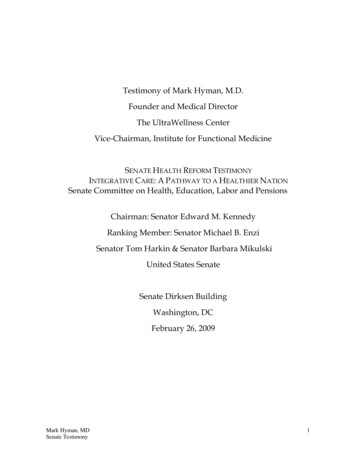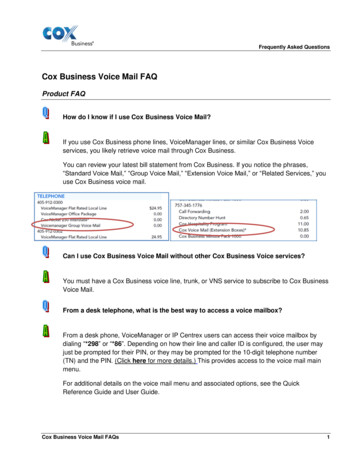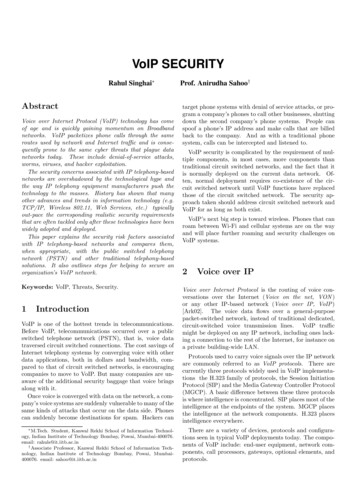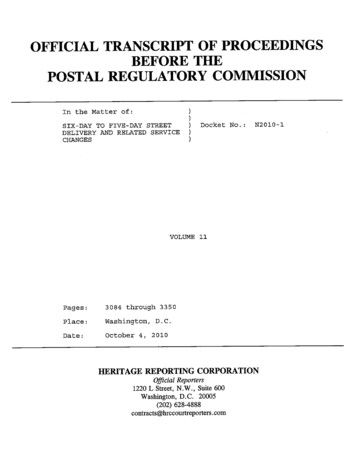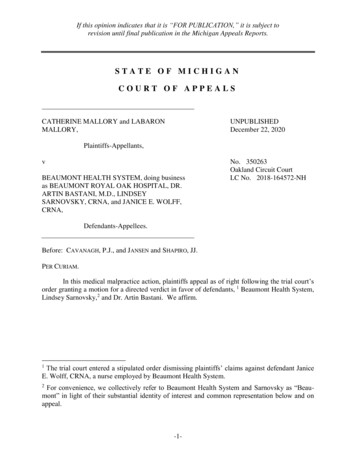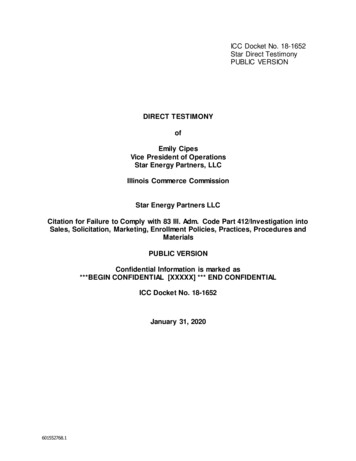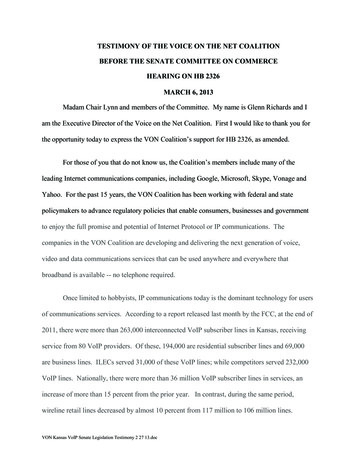
Transcription
TESTIMONY OF THE VOICE ON THE NET COALITIONBEFORE THE SENATE COMMITTEE ON COMMERCEHEARING ON HB 2326MARCH 6, 2013Madam Chair Lynn and members of the Committee. My name is Glenn Richards and Iam the Executive Director of the Voice on the Net Coalition. First I would like to thank you forthe opportunity today to express the VON Coalition’s support for HB 2326, as amended.For those of you that do not know us, the Coalition’s members include many of theleading Internet communications companies, including Google, Microsoft, Skype, Vonage andYahoo. For the past 15 years, the VON Coalition has been working with federal and statepolicymakers to advance regulatory policies that enable consumers, businesses and governmentto enjoy the full promise and potential of Internet Protocol or IP communications. Thecompanies in the VON Coalition are developing and delivering the next generation of voice,video and data communications services that can be used anywhere and everywhere thatbroadband is available -- no telephone required.Once limited to hobbyists, IP communications today is the dominant technology for usersof communications services. According to a report released last month by the FCC, at the end of2011, there were more than 263,000 interconnected VoIP subscriber lines in Kansas, receivingservice from 80 VoIP providers. Of these, 194,000 are residential subscriber lines and 69,000are business lines. ILECs served 31,000 of these VoIP lines; while competitors served 232,000VoIP lines. Nationally, there were more than 36 million VoIP subscriber lines in services, anincrease of more than 15 percent from the prior year. In contrast, during the same period,wireline retail lines decreased by almost 10 percent from 117 million to 106 million lines.VON Kansas VoIP Senate Legislation Testimony 2 27 13.doc
The dramatic growth of IP communications has created viable competition in thecommunications industry, to the benefit of consumers that are saving hundreds of millions ofdollars each year by switching to VoIP and other IP-enabled services. VoIP also providesconsumers flexibility and features not possible in yesterday’s telephone network. These includethe ability to use an IP-enabled phone through any broadband connection anywhere in the world;allowing voice mail to be sent to email or converted to text; allowing multiple devices to ring atthe same time, and bringing video conference calling to the masses. At the same time, qualityand reliability have improved to equal if not surpass that of the legacy phone network.For businesses, particularly small and medium sized businesses that are at times ignoredby larger carriers, IP communications is lowering costs, allowing increased control overcommunications, increasing productivity, increasing mobility, enabling collaboration, and givingcompanies a competitive advantage. IP communications promotes telework; allowing people towork seamlessly from home as if they were in the office; creating more time with family andgreater employment opportunities for parents of small children, adult caregivers and the disabled.IP's ability to converge voice, video, and data into one application makes available newaccessibility options for the tens of millions of disabled Americans. IP communications givesdisabled users a choice as to which mode they want to communicate in. For example, a deafblind person could sign his conversation then read the response on text with a Braille display. Ahearing-impaired person might use text for the main communication, then video to show theiremotional reaction to the conversation.IP communications is also bridging the gap between rural and urban Americans. VoIPcan bring good information age jobs to rural communities, and encourages the rapid deploymentof broadband to rural areas.VON Kansas VoIP Senate Legislation Testimony 2 27 13.doc2
IP communications has prospered in a largely unregulated environment. The FederalCommunications Commission in 2004 found that IP communications between computers shouldnot be regulated at all; and it also that same year preempted state regulation of interconnected VoIP– which are services that are used more like a replacement for regular telephone service. The FCChas, however, imposed certain public safety and consumer protection requirements oninterconnected VoIP providers, such as a requirement to provide 911 services, protect customerdata, report outages and assist law enforcement. There is no federal entry or price regulation ofVoIP.At least 24 states and the District of Columbia have already provided certainty to theinvestment markets by codifying regulatory “safe harbors” for VoIP or IP-enabledcommunications. These states have recognized that there is no benefit to imposing legacytelephone regulations on IP communications and that investment will be lost if regulatoryambiguities are allowed to remain in place. In an otherwise competitive market with low barriersto entry and low switching costs for consumers, entry and rate regulation has the potential tomaterially and adversely impact technological innovation, hinder the growth of open,competitive markets and place unnecessary burdens and costs on companies eager to invest inand deliver innovative products and features.By adopting House Bill 2326, Kansas now has the perfect opportunity to join theseprogressive states and help launch a new era of broadband-enabled benefits for consumers andbusinesses in Kansas by eliminating the threat of conflicting state regulation of two types ofInternet Protocol-enabled services. The first, referred to in this bill as Internet Protocol enabledservice, includes those broadband delivered applications and services used by consumers,businesses, and government every day, such as instant messaging, e-mail, web surfing, search,VON Kansas VoIP Senate Legislation Testimony 2 27 13.doc3
streaming video, and voice communications applications such as Skype video calling.Historically, the FCC has preempted regulation of these offerings. These are the innovativeproducts and applications that are driving Kansas’ information technology economy. To ensurethat consumers continue to have access to these transformative broadband applications, it iscritical that state and local regulation not burden such innovation. HB 2326 recognizes andretains federal preemption of state and local regulation.The bill also refers to another form of IP communications service, identified as Voice overInternet Protocol, or VoIP services, which provide consumers a replacement for their traditionalphone service. VoIP services as defined in HB 2326 and by the FCC are distinguished by theability of consumers to both make calls to and receive calls from the public phone network. TheFCC has created a uniform framework for the regulation of these two-way VoIP services thatapplies in all 50 states. This legislation reinforces the existing federal framework by precludingstate or local governments or agencies in Kansas from attempting to regulate VoIP in conflictwith the FCC.The appropriate policy framework, as embodied in this legislation will facilitatetransformative improvements in the way all people in Kansas communicate that harness thepower of the Internet. Adoption of HB 2326 will provide four critical benefits to the state ofKansas during these challenging economic times:(1) a platform for innovation delivering advanced broadband communications features toconsumers and business in Kansas;(2) increased competition among network and service providers leading to cost savings forconsumers and businesses across the state;VON Kansas VoIP Senate Legislation Testimony 2 27 13.doc4
(3) increased infrastructure investment and accelerated broadband deployment – criticalelements of job creation and economic growth in the state, particularly in rural areas; and,(4) most importantly, this legislation will moot a problematic order issued by the KansasCorporation Commission on January 30, 2013, asserting jurisdiction over what it calls “fixed”VOIP and requiring Time Warner Cable to obtain a Certificate of Convenience and Authority tooffer its Digital Phone Service in Kansas. As noted earlier, the FCC in 2004 preempted stateregulation of VoIP and, in my opinion, this Commission order will not survive judicial scrutiny,if appealed. The order will likely have a chilling effect on the 80 companies providing VoIPservices in Kansas, possibly leading to their exodus from the market and reducing competition,rather than subject themselves to state telephone regulations, including the filing of tariffs. I amaware of only one other state, Vermont, that has a similar regulatory decision in place, and thathas been appealed to the state supreme court.This critical legislation – which must be passed this session -- will ensure the continuedavailability of these broadband communications offerings and open new high-tech economicopportunities by prohibiting regulation of innovative IP-based services, consistent with Federallaw. Everyone in Kansas has much to gain from a regulatory environment that allows innovativeIP enabled applications and services to remain free from regulations originally intended for plainold telephone services.In summary, enabling a consistent and predictable policy framework, thereby fosteringinnovation in VoIP and IP-enabled applications and services can help lead to breakthrough newbenefits for Kansas consumers. The bill provides a platform for innovation, facilitatescompetition and cost savings for consumers, and will drive job growth, broadband deployment,and greater economic prosperity for the state.VON Kansas VoIP Senate Legislation Testimony 2 27 13.doc5
We look forward to working with you and other policy makers in Kansas to forgepragmatic solutions that enable consumers, businesses, and the economy to achieve the fullpromise and potential that VoIP and IP-enabled services can deliver.Thank you again for your time and I look forward to your questions.VON Kansas VoIP Senate Legislation Testimony 2 27 13.doc6
For those of you that do not know us, the Coalition's members include many of the leading Internet communications companies, including Google, Microsoft, Skype, Vonage and Yahoo. For the past 15 years, the VON Coalition has been working with federal and state




